Amazing Grace
 for thematic material involving slavery, and some mild language.
for thematic material involving slavery, and some mild language.
Reviewed by: Rev. Bryan Griem
CONTRIBUTOR
| Moral Rating: | Better than Average |
| Moviemaking Quality: |
|
| Primary Audience: | Adults Teens Family |
| Genre: | Biography History Thriller Drama |
| Length: | 1 hr. 51 min. |
| Year of Release: | 2007 |
| USA Release: |
February 23, 2007 (wide) |
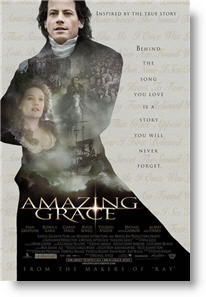
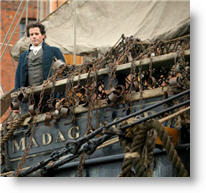
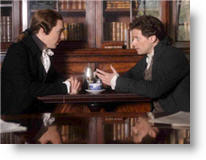


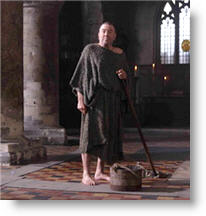
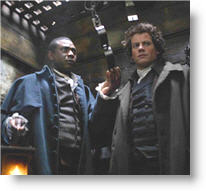
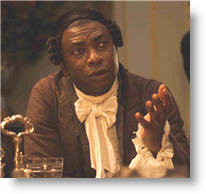

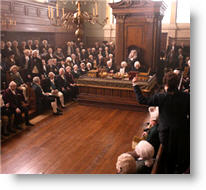
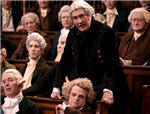
A single man or woman can help change the world. Read about some who did with faith and God’s help…
Jesus Christ, Noah, Abraham, Joseph, Moses, and David
What are the consequences of racial prejudice and false beliefs about the origin of races? Answer
Should Christians seek political power or should we only focus on evangelism? Answer
Were all of America’s Founding Fathers racists, pro-slavery, and hypocrites? Answer
| Featuring |
|---|
|
Ioan Gruffudd Albert Finney Benedict Cumberbatch Michael Gambon Romola Garai |
| Director |
|
Michael Apted |
| Producer |
|
Terrence Malick Patricia Heaton See all » |
| Distributor |
|
Samuel Goldwyn Films Roadside Attractions Bristol Bay |
“Behind the song you love is a story you will never forget.”
 Read our behind the scenes interview with this film’s director—GO
Read our behind the scenes interview with this film’s director—GOTelling people that I just saw a movie about William Wilberforce has drawn more quizzical looks than I would have expected, and it is for this reason that, periodically, we owe Hollywood a debt of gratitude for making historic pictures such as “Amazing Grace.” Having to explain this bit of abolition history to people has given rise to my own interest in learning more about the story, and I think it may lead others similarly. Suffice to say, history is not boring when well told, and I don’t think audiences will think this movie to be boring either. My eleven year old son, who was enamored by the fact that the main character, Ioan Gruffudd, was also one of the “Fantastic Four” superheroes in the movie by that name, was not bored, and actually enjoyed the film very much. He has been studying the subject of slavery in school, and this movie has given him food for thought, and both of us fare for spiritual discussion.
The movie begins at the then current time in Wilberforce’s life, when he is older and ill, and then flashes back to the beginning of his career in Parliament. Wilberforce perpetually presents bills to eliminate the African slave trade, only to have them repeatedly voted down by his colleagues. One colleague favorable to him is to eventually become Prime Minister, and so the two work together, drip by drip, to finally realize their noble objective.
There is an interesting intersection of history and faith at work in this movie, as the slave trader-turned-clergyman, John Newton (played by Albert Finney), makes an appearance. Newton wrote the renowned hymn for which the movie is named, and the song is sung or played several times throughout the story. He utters good and laudable things like, “I am a great sinner, and Christ is a great savior!” He often gives spiritual advice to the young Wilberforce, including the part about God working for change by drips rather than storms. As well, the pastor contributes to the decision of Wilberforce to continue in politics for God, rather than to leave politics for God.
“Amazing Grace” offers many things for the person of faith to consider, and gives a strong message to those outside. This is a film about struggle in life; about staying the course, fighting the good fight, and being salt AND light in a fallen world.
The visual appeal of the movie fills in where mere story leaves off, and it is quite something to see imagined, the greatest power on Earth, over two centuries ago, during the time between the American Revolution and the end of the French one. There are no graphic and gory scenes of tortured victims in this movie, like one might have seen in “Schindler’s List,” or “Amistad” (another movie on slavery). Instead, there are dreamlike allusions to workers near fiery sugar cane furnaces, and visual aids are presented to explain what occurred. This was a surprise, yet all the points were made and not in the least lacking as a result of absent graphics.
Kudos to the producers who put forth this movie of strong Christian activism! It is not a movie espousing limp-wristed, “be warm and fed” Christianity; it is the kind that acts upon its beliefs. Several clergymen, invited by Wilberforce’s friend, William Pitt (Benedict Cumberbatch), pay a visit to the famed statesman, only to add their own convictions that he should not choose between God and country, but that his newfound faith is what should move him all the more toward creating a better world under God.
One of the producers of this film is actress Patricia Heaton, better known for her role on the “Everybody Loves Raymond” sitcom. She is an ardent Christian activist and strong prolife supporter, and the contemporary abortion issue is not unlike the abolition issue of Wilberforce’s era. Wilberforce gave his life to end the hideous and deadly trafficking of human beings in his time. It was his Christian convictions that drove him on, and despite politics, and all the excuses given by representatives of the slave business, he continued to stand for what was good in the sight of God. Wilberforce is thus remembered well, and his work changed the world. Should any in our day begin to weary in the task of ending the abortion trade, they would do well to observe a life of one who didn’t give up when things got hard. Something of worth is worth working for, and right IS might.
There is much good in this film, and I would personally recommend it to any who would ask. Depicted are scenes of money being given to the poor and food being served to the hungry. Fear engulfs the unsaved on their deathbeds, and gratuitous sex and violence are nowhere to be found. “All men are created equal” is declared, and marriage is upheld.
What may be found objectionable in this film is minor, and perhaps even absent in the minds of some Christian communities, but there are a handful of items, some of which are language matters, that should be noted. Wilberforce sits on dewy grass, then announces that his posterior (referred to by a three letter synonym) is wet. The same word is used when the abolitionist opponents were scolded to get theirs moving back into the chamber for a vote. The word “bloody” is used, and this will probably not disturb American ears. The British and Australians, however, seem to be uncertain as to whether this is a legitimate expletive or just an adjective that lends force to a following noun. It is arguably a crudity more than anything. A couple of times, there is a reference to the more profane term for Hades, but even then it seems light, or even warranted. “God” is also uttered a time without specific reference to Him, so there again, an inappropriate and somewhat offensive use.
Because the movie is set in a specific time with its peculiar manners and attire, the fashion of the day for women displayed a busty bit of cleavage. There is nothing especially lewd or overmuch here, only notable and likely to be marked by some who would consider this immodest by their understanding of biblical standards. Similarly, characters drink alcohol, although there is no drunkenness of which to speak. Christians will line up on both sides of this issue, to be sure. The same might be said for the parliamentary pastime of playing cards. One such incident included gambling, and provided a fairly intense moment in the movie when the King’s son, the Duke of Clarence (Toby Jones), ran out of pocket change and bet his slave. Wilberforce immediately forfeited the game and left the table. The Duke referred to his slave using the n-word.
A particular form of opium is prescribed for Wilberforce by his doctor, so it would be a stretch to lump this in with illegitimate drug use, but I mention it in case someone cannot, for whatever reason, countenance the use of medicines. In addition, there are a few background scenes of men smoking pipes.
Viewers of this movie, especially Christians, will walk away richer for the experience. Our sin brings so many evils into the world, but when one who serves Christ stands firm, the tide can turn; it has, and it will, and William Wilberforce is a fine example. People who like history in general, will enjoy the retelling of this monumental moment of fairly recent times, and critics will not find too much to complain about. See the film.
Violence: Minor / Profanity: Minor / Sex/Nudity: None
See list of Relevant Issues—questions-and-answers.


For example, Finney was in infamous “Erin Brockovich,” far-fetched “Big Fish,” and noteworthy for a plump, naked, swearing “Winston Churchill;” Wilberforce’s character is played by the “Titanic” and “Horatio Hornblower” star, Welsh Actor Ioan Gruffudd, (Pronounced YO-an GRIFF-ith), and the young Prime Minister at only 24!!, William Pitt, played by Benedict Cumberbatch (yes, some Brits have funny names!) was in “To the Ends of the Earth” by “Lord of the Flies” author William Golding, the former a nautical movie in the mold of Russell Crowe’s “Master and Commander,” but promoting lust through prostitution and clergy-sailor homosexuality and clergy-suicide, and the latter, cannibalism and boy on boy violence. In “Amazing Grace,” you never do hear the hymn all the way through, but the audience was singing along, laughing, crying and applauding, which in 2007 is pretty amazing in itself! My only criticism is that the abolitionist movement is portrayed as a work of God and ordinary men and women, but without much prayer. When Pitt is afraid of death, all he gets is his hand held, and the man who should know how to share Christian Truth is strangely silent. Overall, a wonderful hour and fifty-one minutes… over too quickly …I can’t wait to buy it and see it again! Well done Hollywood—people love this stuff!!
Excellent! / 4½
I thought this was wonderfully made …cinematography, costumes, directing, acting, however the gospel is not present. The “mentor” (Albert Finney) is a Catholic, and the Catholics for the most part don’t know the gospel and are not sure of their salvation, because it is against the Catechism of the Catholic church as well as the Catholic doctrines to be assured of your salvation… this is the 'sin of presumption'… the best they can hope for is to be in purgatory as short a time as possible, and hopefully enough relatives will pay indulgences to the Catholic Church to get them out. We know that this is not Biblical. But I will do further research on this song of “Amazing Grace” …it is possible for a Catholic monk/priest, such as this Character to be saved and leave the false system of the Catholic church.
So, it was a great movie from a historical point of view. I came away learning much about slavery and what this one brave man did, and how he suffered for his cause. I just don’t believe a non-Christian will walk away knowing that Jesus Christ died for our sins, and understand how they can be saved and live with him in heaven eternally. I don’t believe this movie is suitable for young children. there is a scene at the beginning where a horse is brutally beaten. My 11 yr old would be affected by this.
Good / 5
Excellent! / 5
Excellent! / 4
Excellent! / 4½
reminds me so much of the another unpopular moral battle that rages today: Abortion. Thank you to all those involved in the making of this movie! For giving us a glimpse into the important things that really matter in this life. A movie I will add to my DVD collection when it comes out.
Excellent! / 5
Excellent! / 5
This is a British film with British actors and some may find it hard to follow, slow moving or even boring at times. I watch Masterpiece Theater a lot, so I had no problem following it. The spiritual aspects in the film are handled with sensitivity and truth, just the way they did in “Chariots of Fire,” one of my all time favorite films. This is directed by Michael Apted (Coal Miner’s Daughter) who is a fine director and also stars Ciarán Hinds (The Nativity Story, Munich) and Michael Gambon (Harry Potter movies). I recommend it realizing that it may not be entertaining for everyone. It is certainly a good history lesson on how slavery was abolished at the time. I guess in reality, Wilberforce was a much smaller man, but most people will probably not even know that. I felt that it built to a fine emotional impact at the end.
Excellent! / 4½
Excellent! / 5
Excellent! / 5
Good / 5
Better than Average / 5
I hope that the American public can see that the motivation behind British Abolitionists was based on Christian principles, rather than the American ones who in the end based their cause on Economical values. I would recommend everyone to see this movie and realize that Faith in Christ is the key to all victories.
Good / 5
Excellent! / 4½
Excellent! / 5
Excellent! / 5
First, we as “Christians” were insistent that the name “Jesus” need not be used so much in our art. After all, we said, we don’t have to use Jesus’ name in “everything” we do. “I’m an artist who just ‘happens’ to be a Christian,” we said.
Hogwash! I’m here to tell you that we are Christians first and everything else second—or we’re not Christians at all! We are called to a higher standard than this; to live a life holy and acceptable unto God.
I am appalled (and I’m sure I’m alone in this) that these online movie reviewers attempt to highlight all that’s wrong in the film which includes profanity, nudity, and violence and then turn around and have the audacity to say: “Viewers of this movie, especially Christians, will walk away richer for the experience.”
No, mister reviewer, true Christians will NOT walk away “richer for the experience”, they will walk away compromised having given in to a worldview that is a contradiction and ultimately a stench in God’s nostrils. When will we make a movie that glorifies God without contradiction? When will we be Christians?
Extremely Offensive / 1
This was not a situation like a mall where Christians can look away from immodest images. It was a movie where you are a captive audience and you are there for the sole purpose of staring at the screen for entertainment. I walked out of the movie, but there were many Christians at that showing who chose to do the very thing that Wilberforce so passionately believed was wrong—staying and accepting whatever the culture tolerates, whether or not it is biblical.
I realize that some Christians would say that this is tame compared to all the other stuff that’s out there. But, we don’t hold “other stuff” as our standard of comparison because all that does is constantly lower the bar of morality. For that same reason, we don’t accept sexual content in the name of “historical or cultural accuracy.” Watching historically accurate sexual images doesn’t suddenly make it 'pure…. of good repute… worthy of praise.' (Phil. 4:8)
The other very bad content (even more so) is that God’s name is used profanely, in expressions. How can we be entertained by watching people verbally blaspheme God? I just want to warn Christians who have not yet gone to the movie and are considering it. You need to know about the content. I regret that we took the recommendations of others and didn’t do our normal in-depth research. We won’t make that mistake again. It would have been so easy for the producers to remove the objectionable content and let us all enjoy a really wonderful movie. But they didn’t. We Christians are slowly being desensitized to accept ungodly things in the name of entertainment (or history). I would surmise that if you asked any of those who gave this movie a positive review whether it would have hurt the movie to get rid of the cleavage and the profane references to God, they would agree that it would not hurt the movie one bit; none of that objectionable content was necessary. Yet very few Christians complain.
We need to let producers know that a ‘Christian’ movie is one that shows Christ being honored, not one that uses profanity and sex, however ‘mild’ it is claimed to be.
Very Offensive / 5
Excellent! / 5
Excellent! / 4
The characters all played their parts well, especially Ioan Gruffudd, who played William Wilberforce. Some younger children might be frightened, and kids around 11-13 might be bored (as my brother was) in some parts, but my friend and I really enjoyed it! I think the only negative would be that it wasn’t longer! I could have watched it for another hour! This is a movie well worth your time watching!
Excellent! / 4½
It also mentions God, especially when William Wilberforce (he’s the one who ended the slave trade in 1805) prays for God’s help during the movie and it has some funny jokes in it to but it is mostly a serious movie and I only heard a giggle once from the crowd (the crowd was about 10-15 people). There is really nothing bad to say about it because it has a great movie line and the people in it are great actors. So thus ends my review but I also think it is about a four and a half star movie!
Good / 4½
Excellent! / 4½
Excellent! / 5
Just want to clear something up: John Newton wasn’t a Catholic, and neither was Wilberforce. That is a common misconception. They are both in some kind of Protestant denomination, not Catholic. But that’s OK. All in all, go and see this movie. I recommend it to everyone.
Excellent! / 5
Better than Average / 4½
At the end of the movie, my eyes were filled with tears, especially at the part where they play “Amazing Grace” with the bagpipes. I realized that William Wilberforces’ perseverance in presenting bill after bill for the abolition of the slave trade, sacrificing twenty years of his life committed to this cause, probably changed the English Empire more than we can understand. We will be watching for the DVD release date on “Amazing Grace”!
Excellent! / 4½
Excellent! / 4½
Excellent! / 4½

My Ratings: Excellent! / 5